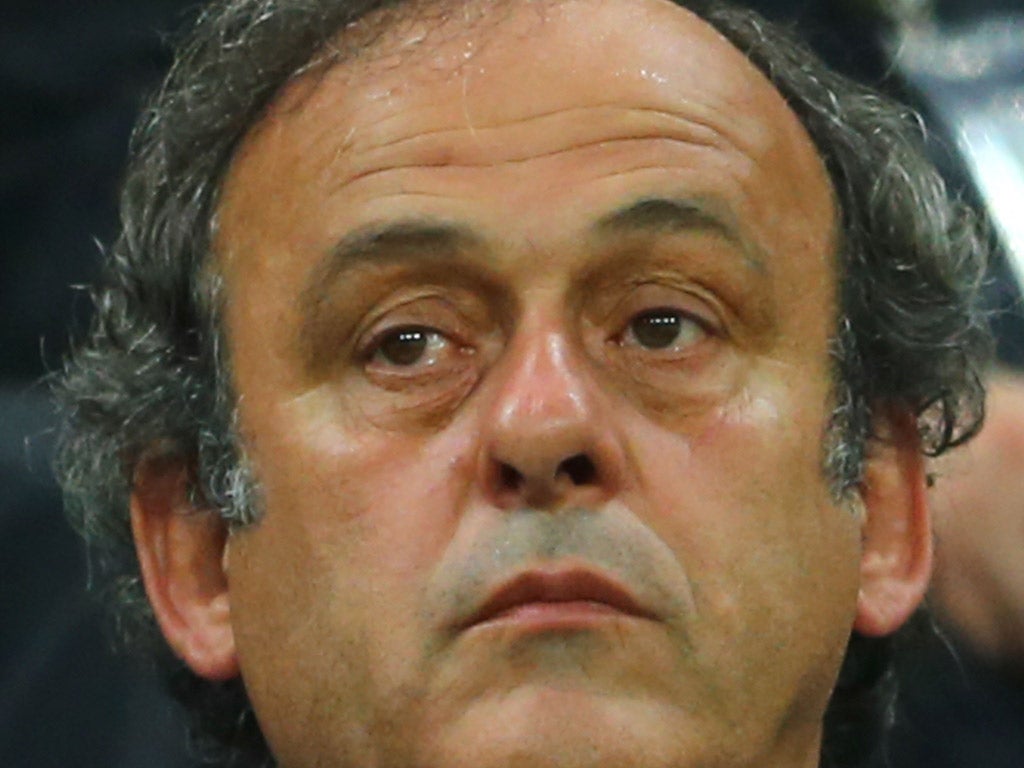Platini's bombshell: Uefa president reveals possible change to Euros format
Frenchman announces controversial plans to scrap host nations and stage the 2020 European Championship in as many as 32 countries

Your support helps us to tell the story
From reproductive rights to climate change to Big Tech, The Independent is on the ground when the story is developing. Whether it's investigating the financials of Elon Musk's pro-Trump PAC or producing our latest documentary, 'The A Word', which shines a light on the American women fighting for reproductive rights, we know how important it is to parse out the facts from the messaging.
At such a critical moment in US history, we need reporters on the ground. Your donation allows us to keep sending journalists to speak to both sides of the story.
The Independent is trusted by Americans across the entire political spectrum. And unlike many other quality news outlets, we choose not to lock Americans out of our reporting and analysis with paywalls. We believe quality journalism should be available to everyone, paid for by those who can afford it.
Your support makes all the difference.The Uefa president Michel Platini revealed yesterday that the governing body are considering staging the 2020 European Championship in up to 32 different countries in a radical departure from the one or two nation host format that has existed in different guises since the tournament began in 1960.
In a press conference that bordered on the farcical at times, Platini at first suggested that the tournament, which will be expanded to 24 participating nations from Euro 2016, in France, would be held in "12 to 13 countries". Later he said that it could be as many as "24 or 32 countries" with host cities and games being played all over the continent.
The idea was floated recently at the governing body and many national federations are aware of it – with not all of them opposed to the concept. Platini said yesterday that the idea had the support of the 16-strong Uefa executive committee but it was most significant that he declared himself "passionate" about taking the tournament all over Europe.
The concept appears to be a reaction to the mess that has been made of the original idea for 2020, which was to hold the tournament in Turkey, who had Platini's backing. However, when Istanbul became one of the three candidate cities for the 2020 Olympics, Uefa realised the nation could not stage both events. "It's a problem to wait for a decision from the IOC," Platini said.
On the question of the expense to fans for flying all over Europe to watch games rather than remaining in one place, Platini was dismissive. "As you know there are low-cost airlines," he replied to one question about expense for supporters. "It sometimes costs less to go between London and Donetsk [sic]... I think it is less expensive."
With the new format of 51 games – excluding any potential plans for a third and fourth place play-off – Platini argued that it would still roughly be four games per city. Asked whether he was making up the plans on the hoof, he said: "It was easier to go from London to Paris or Berlin, than Kharkov to Gdansk. This is still just an idea. We are going to have a lot of conversations but it is still a great debate."
The decision on the host format for Euro 2020 will be made by the Uefa executive committee sometime in December and January. Platini said that there would be less pressure on a host city "to build new airports and stadiums" if the games were spread around, although that would be to ignore the claims of developed football nations like Spain, Germany or England who already have the infrastructure in place.
The Uefa president also defended the decision to adopt a 24-team format for the next European Championship, despite the quality of this 16-team tournament being so high. He said: "We have 24 good teams in Europe. Think about the sides who aren't here, we can find another eight good sides: Norway, Serbia, Belgium, Scotland... the level won't drop at 24. " As expected, Platini remained steadfast in his opposition to goal-line technology despite Ukraine being denied a legitimate goal against England at Euro 2012.
"In the case of Ukraine, there was a goal," Platini said. "It was a mistake from the referee and he didn't see it. But there was offside before then. If they had given offside then there wouldn't have been a goal. So why don't we have technology for offside decisions as well? Then Maradona's 'Hand of God' goal in 1986, why don't we have technology to see if he scored with his hand? Where does it stop? Would we just stop there with goal-line technology? I don't think so, I don't think we would stop anywhere. So I am against technology itself but it will be Fifa, Mr [Sepp] Blatter and the four representatives from Britain on Ifab who will tell us."
Ifab, the rule-making body, will decide on Thursday on the introduction of technology with it potentially implemented in time for the next Premier League season.
There was also a wholesale rejection of the BBC Panorama investigation "Stadiums of Hate" which focussed on racist fans in Ukraine and Poland, from the Ukrainian football federation president Grigoriy Surkis. Surkis said that he was pleased that England fans had made light of Sol Campbell's claim they could "come back in a coffin" by carrying an imitation coffin themselves.
Surkis said: "That was the best reply to the BBC and the former captain of England, Sol Campbell... what impresses me is that a person who has never been to Ukraine can makes such comments about our country... the English FA complained to the BBC and asked to put their side. That told me a lot."
Join our commenting forum
Join thought-provoking conversations, follow other Independent readers and see their replies
Comments